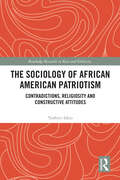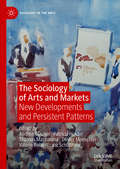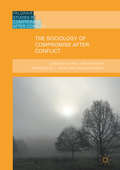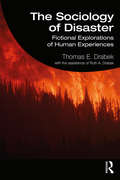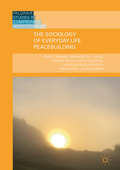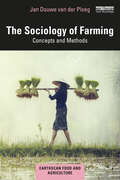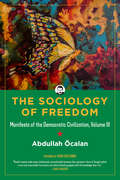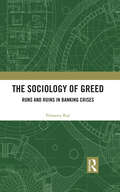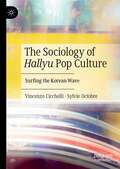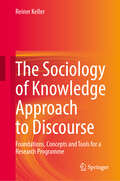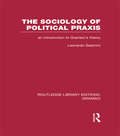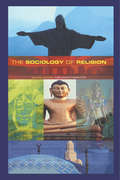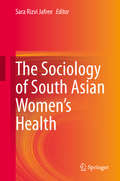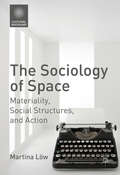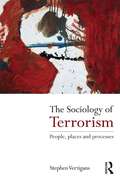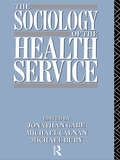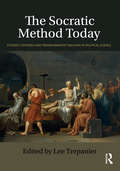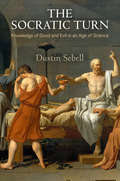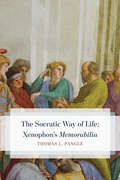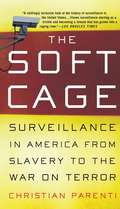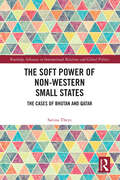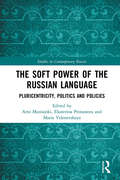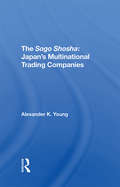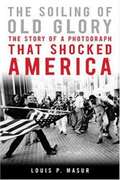- Table View
- List View
The Sociology of African American Patriotism: Contradictions, Religiosity and Constructive Attitudes (Routledge Research in Race and Ethnicity)
by Yoshito IshioThis book offers a sociological examination of the reasons why African Americans feel love toward their country in spite of continuing to perceive or experience racial prejudice and discrimination against themselves and other African Americans. Dr. Ishio conducted face-to-face, in-depth interviews with college-educated African Americans in Texas between 2014 and 2015. The main conclusion of this study is that contradictory trends marked by persistent racism and racial progress, combined with the effects of Christian faith/practice fostered in the Black Church and the effects of foundational principles of the United States, have molded a distinctive form of patriotism among African Americans for whom this country is their homeland. This book presents an insightful analysis by a Japanese sociologist.Every important finding in this book is supported by interviewees’ statements, making it easy for readers to follow the points being made and to understand African Americans’ perspectives. Numerous interviewees’ statements are judiciously inserted so that readers can virtually “hear” interviewees’ voices describing their experiences and views.A unique study of African Americans and their feelings of patriotism, it will appeal to scholars and researchers with interests in the sociology of race and ethnicity, Black studies, and the sociology of religion.
The Sociology of Arts and Markets: New Developments and Persistent Patterns (Sociology of the Arts)
by Thomas Mazzurana Olivier Moeschler Andrea Glauser Patricia Holder Valérie Rolle Franz SchultheisThis edited collection offers an in-depth analysis of the complex and changing relationship between the arts and their markets. Highly relevant to almost any sociological exploration of the arts, this interaction has long been approached and studied. However, rapid and far-reaching economic changes have recently occurred. Through a number of new empirical case studies across multiple artistic, historic and geographical settings, this volume illuminates the developments of various art markets, and their sociological analyses. The contributions include chapters on artistic recognition and exclusion, integration and self-representation in the art market, sociocultural changes, the role of the gallery owner, and collectives, rankings, and constraints across the cultural industries. Drawing on research from Japan, Switzerland, France, Italy, China, the US, UK, and more, this rich and global perspective challenges current debates surrounding art and markets, and will be an important reference point for scholars and students across the sociology of arts, cultural sociology and culture economy.
The Sociology of Compromise after Conflict (Palgrave Studies in Compromise after Conflict)
by John D. BrewerThis book introduces a new and original sociological conceptualization of compromise after conflict and is based on six-years of study amongst victims of conflict in Northern Ireland, South Africa and Sri Lanka, with case studies from Sierra Leone and Colombia. A sociological approach to compromise is contrasted with approaches in Moral and Political Philosophy and is evaluated for its theoretical utility and empirical robustness with in-depth interview data from victims of conflicts around the globe. The individual chapters are written to illustrate, evaluate and test the conceptualization using the victim data, and an afterword reflects on the new empirical agenda in victim research opened up by a sociological approach to compromise. This volume is part of a larger series of works from a programme advancing a sociological approach to peace processes with a view to seeing how orthodox approaches within International Relations and Political Science are illuminated by the application of the sociological imagination.
The Sociology of Disaster: Fictional Explorations of Human Experiences
by Thomas E. DrabekIn a book as illuminating as it is captivating, Thomas E. Drabek presents an in-depth analysis of the emotional impacts of disaster events and the many ripple effects that follow. Through the technique of storytelling, a series of nine fictional stories where characters experience actual disasters of different types throughout the United States illustrate the vulnerabilities and resilience to enhance the readers understanding of disaster consequences. Designed for classroom use, each story is followed by an "Analysis" section wherein discussion and research paper topics are recommended. These highlight links to published research findings. A "References" section details citations for all works included. Brief commentary in a "Notes" section adds further connections to other disasters and relevant research studies. The Sociology of Disaster is an important innovation in disaster education and will become an invaluable resource within universities and colleges that offer degrees in emergency management at both the undergraduate and graduate levels.
The Sociology of Everyday Life Peacebuilding (Palgrave Studies in Compromise after Conflict)
by John D. Brewer Bernadette C. Hayes Francis Teeney Katrin Dudgeon Natascha Mueller-Hirth Shirley Lal WijesingheThis book uses in-depth interview data with victims of conflict in Northern Ireland, South Africa and Sri Lanka to offer a new, sociological conceptualization of everyday life peacebuilding. It argues that sociological ideas about the nature of everyday life complement and supplement the concept of everyday life peacebuilding recently theorized within International Relations Studies (IRS). It claims that IRS misunderstands the nature of everyday life by seeing it only as a particular space where mundane, routine and ordinary peacebuilding activities are accomplished. Sociology sees everyday life also as a mode of reasoning. By exploring victims’ ways of thinking and understanding, this book argues that we can better locate their accomplishment of peacebuilding as an ordinary activity. The book is based on six years of empirical research in three different conflict zones and reports on a wealth of interview data to support its theoretical arguments. This data serves to give voice to victims who are otherwise neglected and marginalized in peace processes.
The Sociology of Farming: Concepts and Methods (Earthscan Food and Agriculture)
by Jan Douwe van der PloegThis book provides a detailed and comprehensive introduction to the concepts and methods of the sociology of farming. The sociology of farming focuses on co-production: the ongoing interaction and mutual transformation of the natural and the social (of ‘human and living nature’) which requires putting the farm labour process centre stage. While there are many books which discuss food and agriculture, this book is different: it delves into the methods and concepts used and presents a comprehensive conceptual framework and the associated methods for research to give students and researchers of agriculture and rural studies a solid set of tools for unravelling the complexities of farming and rural life. Importantly, these tools also empower us to design new ways forward. A wide array of case studies, as wide-ranging as Brazil, Peru, China, the Netherlands, Italy and Guinea Bissau, help readers to grasp the commonalities that underlie strongly diversified and divided rural worlds. The book lists over two hundred basic concepts and includes boxes that discuss the main methods of the sociology of farming. This textbook is essential reading for students and scholars of food and agriculture, agrarian studies, rural development, food and farming systems, peasant studies and environmental sociology.
The Sociology of Freedom: Manifesto of the Democratic Civilization
by Abdullah ÖcalanWhen scientific socialism, which for many years was implemented by Abdullah Öcalan and the Kurdistan Workers' Party (PKK), became too narrow for his purposes, Öcalan answered the call for a radical redefinition of the social sciences. Writing from his prison cell, he offered a new and astute analysis of what is happening to the Kurdish people, their freedom movement, and future prospects for humanity. The Sociology of Freedom is the third volume of a five-volume work titled The Manifesto of the Democratic Civilization. The general aim of the earlier volumes was to clarify what power and capitalist modernity entailed. Here, Öcalan presents his thesis of the Democratic Civilization, based on his criticism of Capitalist Modernity. This volume reveals the remarkable range of one of the Left's most original thinkers with topics such as existence and freedom, nature and philosophy, anarchism and ecology. Recognizing the need for more than just a critique, he has advanced what is the most radical, far-reaching definition of democracy today and argues that a democratic civilization, as an alternative system, already exists, though systemic power and knowledge structures, along with a perverse sectarianism, do not allow it to be seen. This monumental work gives profuse evidence of his position as one of the most influential thinkers of our day.
The Sociology of Greed: Runs and Ruins in Banking Crises
by Prasanta RayThe Sociology of Greed examines crises in financial institutions such as banks from the vantage point of the greed of the people at their helm. It offers an intensive analysis of the banking crises under the conditions of colonial capitalism in early twentieth-century Bengal that led to institutional and social collapse. Breaking new ground, the book looks at the moral economy of capitalism and money culture by focusing on the victims of banking crises, hitherto unexplored in Western empirical research. Through sociological analyses of political economy, it seamlessly combines archival records, survey and statistical data with literary narratives, realist fiction and performing arts to recount how the greed of bank owners and managers ruined their institutions as well as common people. It argues that greed turns perilous when the state and the market facilitate its agency, and it examines the contexts and histories, the indifference of the fledgling colonial state, feeble political response, and the consequences for those who were impacted and the losses, especially the refugees, the lower-middle class and women. The volume also re-composes relevant elements of Western sociological scholarship from classical theories to early twenty-first-century financial sociology. An insightful account of the social history of banking in India, this book will greatly interest researchers and scholars in sociology, economics, history and cultural studies.
The Sociology of Hallyu Pop Culture: Surfing the Korean Wave
by Vincenzo Cicchelli Sylvie OctobreCombining global, media, and cultural studies, this book analyzes the success of Hallyu, or the "Korean Wave” in the West, both at a macro and micro level, as an alternative pop culture globalization. This research investigates the capitalist ecosystem (formed by producers, institutions and the state), the soft power of Hallyu, and the reception among young people, using France as a case study, and placing it within the broader framework of the 'consumption of difference.' Seen by French fans as a challenge to Western pop culture, Hallyu constitutes a material of choice for understanding the cosmopolitan apprenticeships linked to the consumption of cultural goods, and the use of these resources to build youth’s biographical trajectories. The book will be relevant to researchers, as well as undergraduate and postgraduate students in sociology, cultural studies, global studies, consumption and youth studies.
The Sociology of Knowledge Approach to Discourse: Foundations, Concepts and Tools for a Research Programme
by Reiner KellerIn this updated version of a contemporary classic of discourse research, Reiner Keller develops the theoretical and methodological foundations of the Sociology of Knowledge Approach to Discourse (SKAD). Translated from the original German into English for the first time, this book brings together two previously unconnected domains of knowledge analysis in social science: the rich traditions of sociology of knowledge and symbolic interactionism on one hand and the works of discourse studies, especially in relation to Michel Foucault, on the other. It presents a critical discussion of key developments in sociology of knowledge, symbolic interactionist, and related interpretive approaches, explains the communicational turn of recent work in the field, and examines how traditions within sociology of knowledge shifted focus or converged over time. Following this, the book discusses the development of discourse theory and discourse analysis since the 1960s, including critical discourse analysis, hegemony analysis, or cultural studies approaches. Embarking from a profound reconstruction of Michel Foucault’s work, the book then sets its own distinctive course by integrating major elements of Foucault’s perspective with the sociology of knowledge. Along this path, Reiner Keller establishes the heuristics and methodology for a sociology of knowledge approach to discourse, providing a comprehensive research programme for the study of social relations of knowledge and politics of knowledge. Since its first publication in 2005, SKAD has informed a multitude of studies worldwide and across several academic disciplines. Today it can be considered as one of the major perspectives in discourse research in social science and beyond.
The Sociology of Political Praxis (RLE (RLE (RLE (RLE (RLE (RLE (RLE (RLE: Gramsci): An Introduction to Gramsci's Theory
by Leonardo SalaminiThis volume analyses the philosophical nature of Gramsci’s Marxism and its Hegelian source, the radical critique of the economistic tradition and the original analyses of the role of superstructures, ideology, consciousness and subjectivity in the revolutionary process. It relates the central themes of Gramsci’s writings, such as hegemony, ‘historical blocs’, the role of intellectuals and political praxis, to the more peripheral ones, such as science, language, literature and art. The introduction includes a brief intellectual biography of Gramsci.
The Sociology of Postmarxism (Routledge Advances in Sociology)
by Richard HowsonPostmarxism is often depicted as a point of intersection for a set of inter-disciplinary theories that are in themselves complex and dense. Bringing the postmarxist theory of Ernesto Laclau into the field of political sociology through a close reading and analysis of postmarxism and its relationship to ‘the social’, A Sociology of Postmarxism develops key postmarxist arguments in an engaging and sociologically applicable way. Indeed, through a threefold method of analysis, Howson first unpacks the relationship between ‘the social’ and ‘the political’ by analysing key allied theories to show where the points of connection occur. This is then followed by an insightful analysis of the key features of postmarxist theory such as antagonism and the inevitability of social dislocation, the political importance of hegemony; and the empty signifier thesis and equivalence to show how such theory can be applied at a sociological level. Finally, through the use of sociological categories such as masculinities, migration and social capital, the foregoing theoretical analyses are synthesised to show the social nature of postmarxism and particularly in the context of aspiration and co-operation. This enlightening volume will appeal to undergraduate and postgraduate students, as well as postdoctoral researchers who are interested in fields such as Political Sociology, Post Marxist Political Theory and Social Theory.
The Sociology of Religion: Theoretical and Comparative Perspectives
by Malcolm B. HamiltonThis clear introduction to the sociology of religion combines a discussion of key theorists with a modern emphasis on the diversity of religious beliefs and practices. Malcolm Hamilton's expanded second edition brings the discussion fully up-to-date, and extends its material on secularization and religious sects, giving a broad comparative view. Drawing on the insights of history, anthropology and sociology, he surveys classic and contemporary theory to give a full picture of the variety and scope of theoretical perspectives.
The Sociology of South Asian Women’s Health
by Sara Rizvi JafreeThis contributed volume is the first-known collection of essays that brings together scholarly review, critiques, and primary and secondary data to assess how sociocultural factors influence health behavior in South Asian women. The essays are authored by working scholars or healthcare practitioners from Bangladesh, India, and Pakistan. In the chapters, the contributors acknowledge social, economic, and environmental factors to recommend improved interventions and health policy for women of the region.Studies on South Asian women’s health have targeted clinical evidence, with less attention on social and environmental factors driving health recovery and health outcomes. The South Asian region, more than any other part of the world, is driven by traditional and cultural forces that are possibly the most significant factors determining a woman’s health awareness and her rights to adopt healthy behavior or pursue health recovery. Women of the region share a common culture and political history, and there are benefits to understanding their problems collectively in order to design joint improvements in health policy for women.Salient, but neglected, socio-political areas that influence health behavior and health outcomes in women of the region are covered in the chapters including:Oral Narrations of Social Rejection Suffered by South Asian Women with Irreversible Health Conditions Women’s Role in Decision-Making for Health Care in South Asia Poverty, Health Coverage, and Credit Opportunities for South Asian WomenRefugee, Displaced, and Climate-Affected Women of South Asia and Their Health ChallengesThe Political Sociology of South Asian Women’s HealthThe Sociology of South Asian Women’s Health is a useful resource for students, researchers, and academicians, especially those interested in public health, gender, social policy, and occupational management, as well as healthcare practitioners, administrators, health and public policy-makers, government officers, and scholars of South Asian studies.
The Sociology of Space: Materiality, Social Structures, and Action (Cultural Sociology)
by Martina LöwIn this book, the author develops a relational concept of space that encompasses social structure, the material world of objects and bodies, and the symbolic dimension of the social world. Löw’s guiding principle is the assumption that space emerges in the interplay between objects, structures and actions. Based on a critical discussion of classic theories of space, Löw develops a new dynamic theory of space that accounts for the relational context in which space is constituted. This innovative view on the interdependency of material, social, and symbolic dimensions of space also permits a new perspective on architecture and urban development.
The Sociology of Terrorism: People, Places and Processes
by Stephen VertigansThis is the first terrorism textbook based on sociological research. It adopts an innovative framework that draws together historical and modern, local and global, and social processes for a range of individuals, groups and societies. Individual behaviour and dispositions are embedded within these broader relationships and activities, allowing a more holistic account of terrorism to emerge. In addition, the shifting forms of identification and interwoven attitudes to political violence are discussed in order to explain the emergence, continuation, and end of ‘terrorist’ careers. The book draws on examples from across the discursive spectrum, including religious, ‘red’ and ‘black’ racialist, nationalist, and trans-national. It also spans territories as diverse as Chechnya, Germany, Italy, Japan, Northern Ireland, Pakistan, Palestine, Saudi Arabia, South America, the UK, and the US.
The Sociology of the Health Service
by Michael Bury Jonathan Gabe Michael CalnanThe Sociology of the Health Service responds directly to the need to develop a sociological analysis of current health policy. Topics covered vary from privatisation and health service management to health education and the politics of professional power. Also included is an histroical review of sociology's contributions to health policy and proposals for an agenda for sociological health policy research in the 1990s.
The Socratic Method Today: Student-Centered and Transformative Teaching in Political Science
by Lee TrepanierThis exciting new textbook provides a sophisticated examination of the Socratic method for teaching political science students in higher education. It shows how the Socratic method is employed in the Platonic dialogs, compares its transformative approach to other student-centered teaching philosophies, and addresses the challenges of adopting the Socratic method in the contemporary classroom. The book is divided into three sections that integrate these practical aspects on the Socratic method with the theoretical considerations of Socratic philosophy while also addressing contemporary concerns about teaching and learning in higher education. Section One explores how the Socratic method is portrayed by Socrates in Plato’s dialogs. Section Two compares the Socratic method with modern and contemporary accounts of teaching and learning. Section Three examines some of the contemporary challenges of practicing the Socratic method in the university classroom today and how teachers can overcome them. Written in a clear and engaging style, this timely intervention is essential reading for upper undergraduate students enrolled in courses that specialize in pedagogical techniques, political theory, Socratic philosophy, and law.
The Socratic Turn
by Dustin SebellThe Socratic Turn addresses the question of whether we can acquire genuine knowledge of good and evil, right and wrong. Reputedly, Socrates was the first philosopher to make the attempt. But Socrates was a materialistic natural scientist in his youth, and it was only much later in life--after he had rejected materialistic natural science--that he finally turned, around the age of forty, to the examination of ordinary moral and political opinions, or to moral-political philosophy so understood.Through a consideration of Plato's account of Socrates' intellectual development, and with a view to relevant works of the pre-Socratics, Xenophon, Aristotle, Hesiod, Homer, and Aristophanes, Dustin Sebell reproduces the course of thought that carried Socrates from materialistic natural science to moral-political philosophy. By doing so, he seeks to recover an all but forgotten approach to the question of justice, one still worthy of being called scientific.
The Socratic Way of Life: Xenophon’s “Memorabilia”
by Thomas L. PangleThe Socratic Way of Life is the first English-language book-length study of the philosopher Xenophon’s masterwork. In it, Thomas L. Pangle shows that Xenophon depicts more authentically than does Plato the true teachings and way of life of the citizen philosopher Socrates, founder of political philosophy. In the first part of the book, Pangle analyzes Xenophon’s defense of Socrates against the two charges of injustice upon which he was convicted by democratic Athens: impiety and corruption of the youth. In the second part, Pangle analyzes Xenophon’s account of how Socrates’s life as a whole was just, in the sense of helping through his teaching a wide range of people. Socrates taught by never ceasing to raise, and to progress in answering, the fundamental and enduring civic questions: what is pious and impious, noble and ignoble, just and unjust, genuine statesmanship and genuine citizenship. Inspired by Hegel’s and Nietzsche’s assessments of Xenophon as the true voice of Socrates, The Socratic Way of Life establishes the Memorabilia as the groundwork of all subsequent political philosophy.
The Soft Cage: Surveillance in America From Slavery to the War on Terror
by Christian ParentiOn a typical day, you might make a call on a cell phone, withdraw money at an ATM, visit the mall, and make a purchase with a credit card. Each of these routine transactions leaves a digital trail for government agencies and businesses to access. As cutting-edge historian and journalist Christian Parenti points out, these everyday intrusions on privacy, while harmless in themselves, are part of a relentless (and clandestine) expansion of routine surveillance in American life over the last two centuries-from controlling slaves in the old South to implementing early criminal justice and tracking immigrants. Parenti explores the role computers are playing in creating a whole new world of seemingly benign technologies-such as credit cards, website "cookies," and electronic toll collection-that have expanded this trend in the twenty-first century. The Soft Cage offers a compelling, vitally important history lesson for every American concerned about the expansion of surveillance into our public and private lives.
The Soft Power of Non-Western Small States: The Cases of Bhutan and Qatar (ISSN)
by Sarina TheysThis book critically engages with the concepts of small states and soft power and advances a new approach to defining small states, a new conceptualisation of soft power, and a method for empirically analysing the exercise of soft power. It revisits the concepts of small states and soft power with a focus on Bhutan and Qatar and their approach to exercise soft power to achieve their foreign policy goals.Building on two main perspectives to define small states – the objective approach and the subjective perspective – this book offers an intersubjective approach to define states as small. The intersubjective approach requires a shared understanding between states that a certain state is small. The book further highlights the importance of deconstructing the meaning of size and to separate the notion of size from the concept of power because size is not always indicative of power. It argues that although small states tend to have fewer material resources than large states, they nevertheless can have influence through the exercise of soft power. Soft power is in this book defined as the ability of an actor to convince another actor that something is true. Convincing deals with the beliefs of an actor and is a mental decision rather than a physical action. This book argues that the exercise of soft power can be analysed through examining the development, projection, and reception of identities. The findings of this book show that Bhutan was more successful than Qatar in exercising soft power and explains the reasons for this variation.Aimed at a multidisciplinary audience, this book will be of particular interest to practitioners, scholars, and students of International Relations, Political Power, Small States, and Area Studies.
The Soft Power of the Russian Language: Pluricentricity, Politics and Policies (Studies in Contemporary Russia)
by Maria Yelenevskaya Arto Mustajoki Ekaterina ProtassovaExploring Russian as a pluricentric language, this book provides a panoramic view of its use within and outside the nation and discusses the connections between language, politics, ideologies, and cultural contacts. Russian is widely used across the former Soviet republics and in the diaspora, but speakers outside Russia deviate from the metropolis in their use of the language and their attitudes towards it. Using country case studies from across the former Soviet Union and beyond, the contributors analyze the unifying role of the Russian language for developing transnational connections and show its value in the knowledge economy. They demonstrate that centrifugal developments of Russian and its pluricentricity are grounded in the language and education policies of their host countries, as well as the goals and functions of cultural institutions, such as schools, media, travel agencies, and others created by émigrés for their co-ethnics. This book also reveals the tensions between Russia’s attempts to homogenize the 'Russian world' and the divergence of regional versions of Russian reflecting cultural hybridity of the diaspora. Interdisciplinary in its approach, this book will prove useful to researchers of Russian and post-Soviet politics, Russian studies, Russian language and culture, linguistics, and immigration studies. Those studying multilingualism and heritage language teaching may also find it interesting.
The Sogo Shosha: Japan's Multinational Trading Companies
by Alexander YoungThe sogo shosha, Japan's general trading companies, are regarded as a key element in the country's rapid economic growth after World War II and its great success in international trade. In Japanese fiscal year 1975, the ten largest sogo shosha had total sales of $155 billion, accounting for 56 percent of Japan's exports and imports, 18 percent of domestic wholesale trade, and 31 percent of GNP. On the international level, the transactions of these companies in the same year were 5 percent of world export trade. This book—the first comprehensive, English-language work on the sogo shosha—systematically describes and analyzes the basic characteristics, business methods, sales and profit trends, strategies, national roles, global reach, strengths and weaknesses, and future prospects of these global trading conglomerates. In examining both the national and the global facets of the sogo shosha, the author presents the economic and social origins of the ten largest companies, how they differ from the pre-World War II zaibatsu, and how they resemble and differ from Western multinational corporations. A wealth of statistical and tabular material supplements his account of the sogo shosha as Japan's chief importers of foodstuffs, raw materials, and equipment; as the advance guard of Japanese exports; as a driving force to rationalize the domestic distribution system; and as investor-organizers of multinational overseas natural resource development programs.
The Soiling of Old Glory: The Story of a Photograph That Shocked America
by Louis P. MasurSometimes a moment can change history. This one took 1/250th of a second. The photograph strikes us with visceral force, even years after the instant it captured. A white man, rage written on his face, lunges to spear a black man who is being held by another white. The assailant's weapon is the American flag. Boston, April 5, 1976: As the city simmered with racial tension over forced school busing, newsman Stanley Forman hurried to City Hall to photograph that day's protest, arriving just in time to snap the image that his editor would title "The Soiling of Old Glory. " The photo made headlines across the U. S. and won Forman his second Pulitzer Prize. It shocked Boston, and America: Racial strife had not only not ended with the 1960s, it was alive and well in the cradle of liberty. Louis P. Masur's evocative "biography of a photograph" unpacks this arresting image in a tour de force of historical writing. He examines the power of photography and the meaning of the flag, asking why this one picture had so much impact. Most poignantly, Masur recreates the moment and its aftermath, drawing on extensive interviews with Forman and the figures in the photo to reveal not just how the incident happened, but how it changed the lives of the men in it. The Soiling of Old Glory, like the photograph it is named for, offers a dramatic window onto the turbulence of the 1970s and race relations in America.
